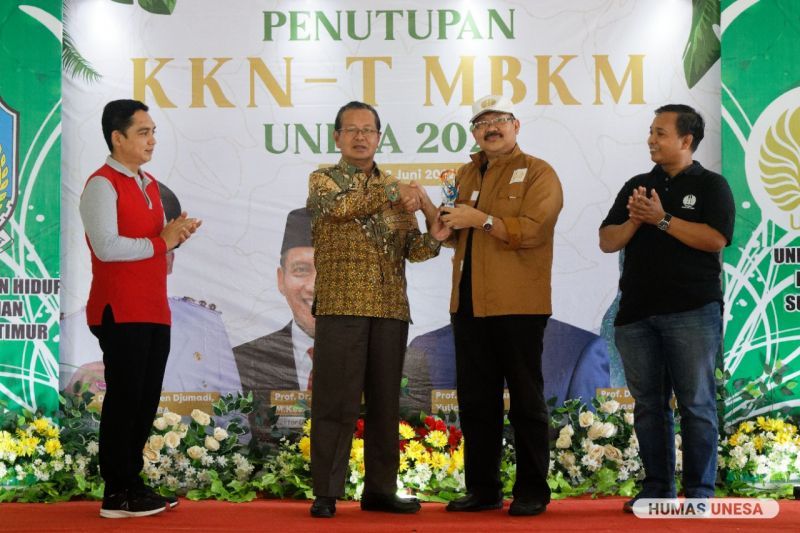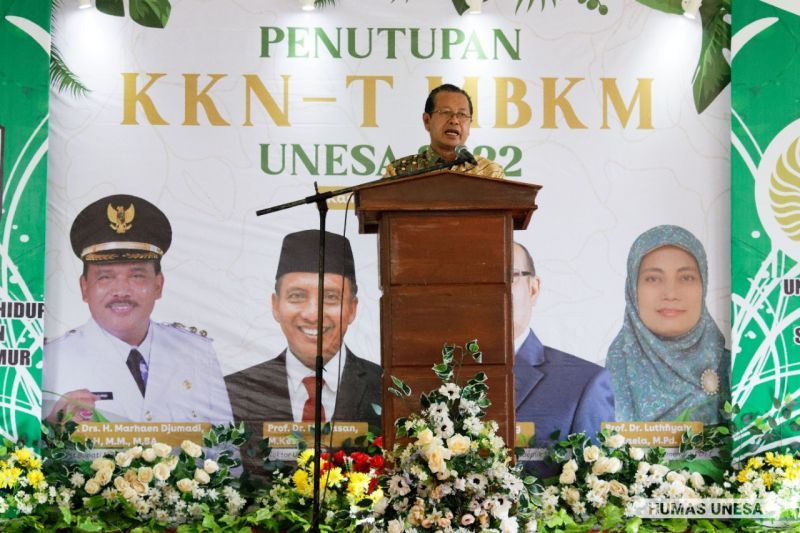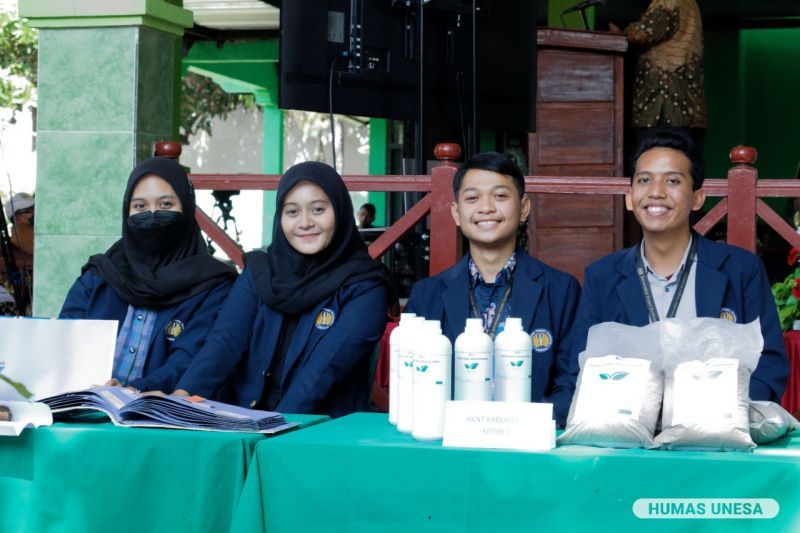
www.unesa.ac.id
Unesa.ac.id, NGANJUK - Students of the Thematic Real Work Lecture (KKN-T) Merdeka Learn and the Independent Campus (MBKM) of the State University of Surabaya (UNESA) this semester produced 219 village programs and 78 business or start-ups in villages spread over 25 districts, East Java.
The business startups initiated by the students cover the fields of culinary, tourism, digital marketing, to the creative economy. This was revealed by the UNESA KKN division at the closing of the 2022 UNESA MBKM KKN-T in Nganjuk, on Thursday, June 23, 2022.
“This is proud, because students are really learning while making a positive contribution to improving the quality of life of rural communities. Some are making creative cafes, some are designing applications and many more," said Dr. Nurkholis, M.Pd., Head of the UNESA Community Service Division at the location.
He added that this semester's KKN-T UNESA involved 2,745 students spread over 25 villages, 15 regencies and cities in East Java. There are five themes implemented which include the theme of humanity, entrepreneurship, teaching assistance, projects in villages and the theme of independent projects.
Humanitarian themes include blood donation programs, making hand sanitizers, disaster mitigation, trauma healing and behavioral change ambassador programs to fitness and sports. Then the theme of entrepreneurship is a program to improve food products, digital marketing, product packaging, education, Bumdes, creative economy to hydroponics.
“The theme of teaching assistance is mostly related to public education and literacy. Then projects in the village include composting programs, eco enzymes, culinary plants, village or tourist village programs, to culinary village programs and stunting-free villages," he explained.
In addition to the above programs, students also run government programs such as teaching campuses throughout the region, Sabang-Merauke. In addition, there is the Village Development and Empowerment Holistic Program (PHP2D), the Village Empowerment Development Program (P3D), National Community Service Program and Behavior Change.

www.unesa.ac.id
305 MCC with Partner
The UNESA KKN-T also produced 305 cooperation agreements (PKS) with partners, including village governments, village business entities, education units, MSMEs, health centers, and others. "There are still many collaborations that are still in the process of signing off. There are 23 study programs that have finished signing the PKS," he explained.
Vice Chancellor for Academic Affairs, Prof. Dr. Bambang Yulianto, M.Pd., KKN-T said that KKN-T was specifically designed so that UNESA students run six courses and 20 credits for four months to study and make direct contributions to the community and village government.
He wants students to learn, but the community gets or feels the results firsthand. “Students come to the village bringing complete ideas. They have to explore what the problems are and what the potential is in the village. The problem is solved, like stunting for example. Then the potential of the village is explored and developed, such as the tourism village program or culinary campus, for example," he said.
Appreciated by the local government
The UNESA KKN-T program was appreciated by various parties, including the Nganjuk Regency government. Regional Secretary (Sekda) Nganjuk Regency, Drs. M. Yasin., M.Sc., expressed his deepest gratitude and appreciation for all levels of UNESA leaders, lecturers and students who were involved in the KKN program. According to him, it is time for the village to develop and advance through the touch and creative ideas of students.
“There are so many programs and innovations that have been born. This is extraordinary and certainly very useful in developing villages in Nganjuk in particular and East Java in general. Of course there is still a lot of unexplored potential like in the villages of Nganjuk district. Therefore, the collaboration between the Regency Government and UNESA must continue to be strengthened, one of which is the KKN-T program. We can continue to explore the potential of the village and develop it together through the next program or KKN-T," he said.
***

www.unesa.ac.id
Head of MBKM UNESA Dr. Mohamad Soleh., M.Pd., said that the MBKM KKN was a mandate from the government which was implemented by UNESA in the form of the MBKM KKN-T which contained six courses equivalent to 20 credits or 18 face-to-face meetings with a duration of 4 months. KKN-T MBKM UNESA puts more emphasis on education and community empowerment through participatory and learning approaches to increase public awareness and understanding of the potential and challenges they have to improve the quality of life both individually and in community groups in the village.
“KKN-T MBKM is different from KKN in general. Students are really required to be involved in developing the village through various selected programs. In the past, the KKN only lasted a few days. I gained a few kilos. Eat four or even five times a day. His job is to paint the village gate, the village office fence and residents. Now, it's different, students must have programs that really have an impact on improving the quality of life of people in the village," he said.
The closing of the KKN-T was attended by the leadership of UNESA, the deans of deans, the head of the study program, field supervisors, and subject supervisors. In addition, it was attended by a number of district government officials including the Nganjuk Regency Government, sub-district and village heads, students, resource persons and many others. [UNESA PR]
Share It On:






